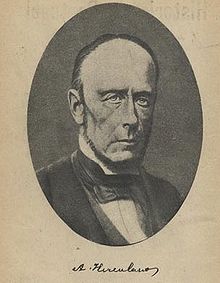Alexandre Herculano
| Alexandre Herculano | |
|---|---|
 |
|
| Born | Alexandre Herculano de Carvalho e Araújo March 28, 1810 Lisbon, Portugal |
| Died | September 13, 1877 (aged 67) Santarém, Portugal |
| Occupation | Novel writer, poet, journalist, historian, politician |
| Genre | Historical novel, Romantic poetry |
| Literary movement | Romanticism |
| Notable works | Eurico, o Presbítero, O Monge de Cister, História de Portugal de Alexandre Herculano, História da Origem e Estabelecimento da Inquisição em Portugal |
Alexandre Herculano de Carvalho e Araújo (March 28, 1810 – September 13, 1877) was a Portuguese novelist and historian.
Herculano's family had humble origins. One of his grandfathers was a foreman stonemason in the royal employ. Herculano received his early education, comprising Latin, logic and rhetoric, at the Necessidades Monastery, and spent a year at the Royal Marine Academy studying mathematics with the intention of entering on a commercial career. In 1828 Portugal fell under the absolute rule of D. Miguel, and Herculano, becoming involved in the unsuccessful military pronunciamento of August 1831, had to leave Portugal clandestinely and take refuge in England and France. In 1832 he accompanied the Liberal expedition to Terceira Island as a volunteer, and was one of D. Pedro's famous army of 7,500 men who landed at the Mindelo and occupied Porto. He took part in all the actions of the great siege, and at the same time served as a librarian in the city archives. He published his first volume of verses, A Voz de Propheta, in 1832, and two years later another entitled A Harpa do Crente.
Privation had made a man of him, and in these little books he proves himself a poet of deep feeling and considerable power of expression. The stirring incidents in the political emancipation of Portugal inspired his muse, and he describes the bitterness of exile, the adventurous expedition to Terceira, the heroic defence of Porto, and the final combats of liberty. In 1837 he founded the Panorama in imitation of the English Penny Magazine, and there and in Illustraco he published the historical tales which were afterwards collected into Lendas e Narrativas; in the same year he became royal librarian at the Ajuda Palace, which enabled him to continue his studies of the past. The Panorama had a large circulation and influence, and Herculano's biographical sketches of great men and his articles of literary and historical criticism did much to educate the middle class by acquainting them with the story of their nation, and with the progress of knowledge and the state of letters in foreign countries.
...
Wikipedia
